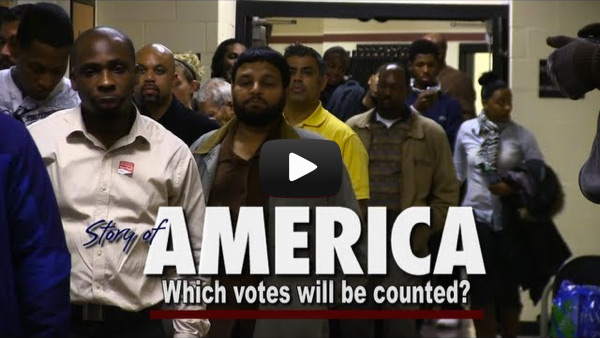
This video shot on election day 2012 is the best documentation so far of the unfairness of long lines at the polls in urban centers. Subsequently, other swing states such as Ohio, North Carolina, and Wisconsin have implemented policies designed to engineer long lines at the polls in urban centers.
Defenders of this strategy say election administration should be ‘equal’ regardless of population density, even if this means unequal access to the polls due to waiting times. Conservative lawmakers, who have accepted and implemented election law changes suggested by the American Legislative Exchange Council (ALEC) and the Heritage foundation have also accepted the argument that the constitutional right to equal justice under law does not protect things like early voting and weekend voting simply because they help to ease long lines in populated areas. Instead, they argue, the notion of equal protection can be used to justify cutting back on early voting and weekend voting because they are essential to avoid long lines where the population is dense, but less so where the population is sparse.
Critics of the “long lines” electoral strategy compare it to Jim Crow practices such as poll taxes, saying that wage earners who miss time at work or have to hire child care in order to wait five or more hours to vote are facing the equivalent of a poll tax.
By contrast, we shot the video below on the same day, in a more rural area of Virginia 2 hours southwest, not far from James Madison University:
Story of America is working on a more in-depth video on this subject. DONATE so that the story can continue.
Original blog post from Nov, 2012:
River Oaks Precinct is the most African-American precinct, in the most ethnically diverse district of Prince William County, Virginia. On November 6, 2012, the polling place at Potomac Middle School did not record its last vote until 10:45 pm, nearly four hours after polls had officially closed.
According to Woodbridge District Supervisor Frank Principi, Virginia law requires that one voting machine be assigned per 750 registered voters. By contrast, Maryland law requires one voting machine per 200 registered voters. This polling place did not appear to adhere to Virginia’s law, with only six voting machines and over 5,000 registered voters. Occoquan District Supervisor Michael May included in his post-election newsletter an official statement from the Prince William County Electoral Board. It reads in part, “We would like to make clear that The Office of Voter Registration and Elections has been fully funded by the Board of County Supervisors. No budget requests have been denied by the Board of County Supervisors.”
Election officials told us that the lines had been long all day, and many people were forced to brave the cold for as many as five hours. As the sun fell and temperatures dropped, the entire line was moved inside by snaking it through the hallways of the middle school. We arrived shortly before the polls closed at 7 pm. We documented the events that took place between 7 pm and 11 pm.
The Romney campaign had a poll watcher there (he is the man in the three piece suit) at the end of the line. He made sure that no one got in line after 7 pm, which, was also the job of the Greg Jackson, the election officer who decided to go to the back of the line and go through the same ordeal as his neighbors. The Romney poll watcher was polite and professional, as was Mr. Jackson. By the end they seemed to have become friends.
By far the most memorable part of the night was the deep patriotism and civic heroism of the thousands of people who stood in line, some for more than four hours, in order to cast their vote. According to an Obama volunteer who was there from before the opening the polls until after they closed, only five people gave up and did not vote on this day. People in line told us that many of them had to come back more than two times because they could not find three or more hours in their day when they could be away from their jobs and families. The ordeal became a bonding experience for this community. We asked one woman, who was an immigrant voting in her fourth presidential election, whether this experience would deter her. She said absolutely not.
There was a 17-year-old African-American man, who said he was a Republican, who spent the entire four hours looking after his mother, a Democrat, who would be casting her vote for President Obama. Each time the line moves, the young man carried the chair that his mother had been sitting upon a little bit closer to the polling place.
At River Oaks precinct, 2,826 votes were cast, 84% for President Obama. Obama won the commonwealth of Virginia by 100,499 votes, by a 50.57% to 47.85% margin.
Please support Story of America with a tax deductible donation.
